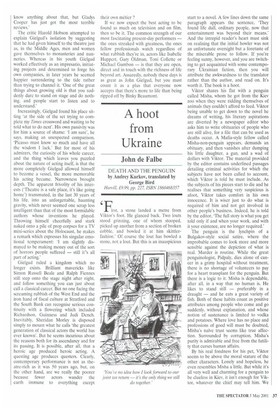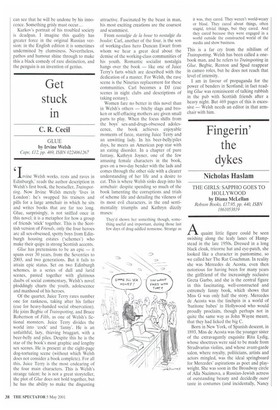A hoot from Ukraine
John de Falbe
DEATH AND THE PENGUIN by Andrey Kurkov, translated by George Bird Hamill, 49.99, pp. 227. ISBN 1860468357 First, a stone landed a metre from Viktor's foot. He glanced back. Two louts stood grinning, one of whom stooped, picked up another from a section of broken cobble, and bowled it at him skittlerfashion.' Of course the lout has bowled a stone, not a lout. But this is an inauspicious start to a novel. A few lines down the same paragraph appears the sentence, 'They found life dull, ordinary people, now that entertainment was beyond their means.' And the intrepid reader's heart must sink on realising that the initial howler was not an unfortunate oversight but a foretaste of the miserable prose to follow. If you're feeling sunny, however, and you are twitching to get acquainted with some contemporary Ukrainian fiction, then you will attribute the awkwardness to the translator rather than the author, and read on. It's worth it. The book is a hoot.
Viktor shares his flat with a penguin called Misha, whom he got from the Kiev zoo when they were ridding themselves of animals they couldn't afford to feed. Viktor being unable to get down to the novel he dreams of writing, his literary aspirations are diverted by a newspaper editor who asks him to write obituaries of people who are still alive, for a file that can be used as deaths occur. A Mafia-style fellow called Misha-non-penguin appears, demands an obituary, and then vanishes after dumping his little daughter, a gun, and a wad of dollars with Viktor. The material provided by the editor contains underlined passages detailing criminal activities for which the subjects have not been called to account, which Viktor is told he must include. As the subjects of his pieces start to die and he realises that something very suspicious is afoot, Viktor takes comfort in his own innocence. It is wiser just to do what is required of him and not get involved in other people's business. Indeed, he is told by the editor, 'The full story is what you get told only if and when your work, and with it your existence, are no longer required.'
The penguin is the lynchpin of a Bulgakov-style social satire, where the improbable comes to look more and more sensible against the depiction of what is real. Murder is routine. While the great penguinologist, Pidpaly, dies alone of cancer in a grimy hospital without treatment, there is no shortage of volunteers to pay for a heart transplant for the penguin. But there is a logic to it. Misha is dependable, after all, in a way that no human is. He likes to stand still — preferably in a draught — and he eats a great variety of fish. Both of these habits count as positive attributes among people who come and go suddenly, without explanation, and whose notion of sustenance is limited to vodka and potatoes. Where love has no place and professions of good will must be doubted, Misha's naive trust seems like true affection. Surrounded by corruption, Misha's purity is admirable and free from the futility that curses human affairs.
By his real fondness for his pet, Viktor seems to be above the moral stature of the other characters. Lonely and hopeless, he even resembles Misha a little. But while it's all very well and charming for a penguin to be clueless in Kiev, it isn't enough for Viktor, whatever the chief may tell him. We can see that he will be undone by his innocence. Something grisly must occur...
Kurkov's portrait of his troubled society is deadpan. I imagine this quality has greater force in the original Russian version: in the English edition it is sometimes undermined by clumsiness. Nevertheless, pathos and humour shine through to make this a black comedy of rare distinction, and the penguin is an invention of genius.











































































 Previous page
Previous page